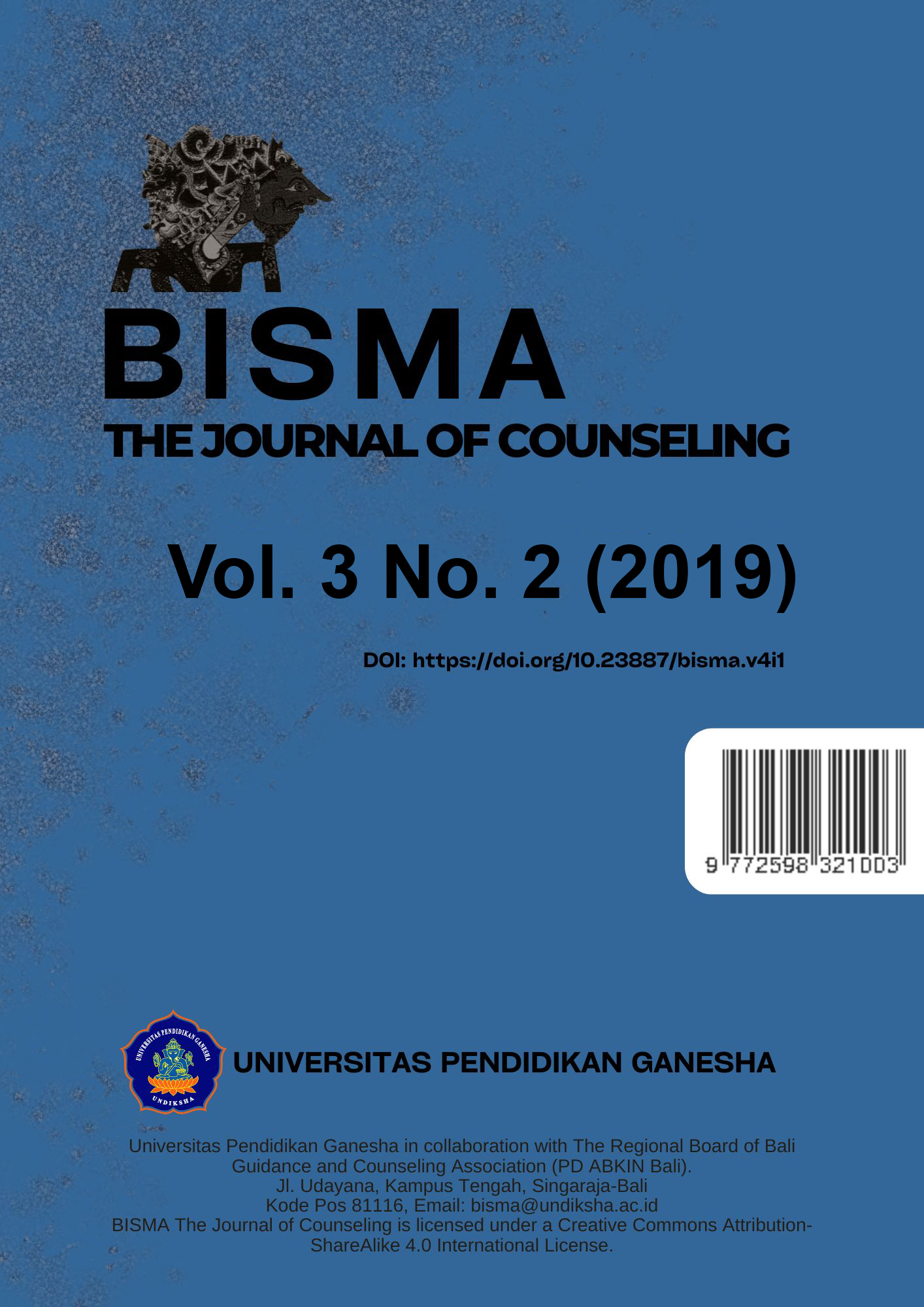The Relationship Between Self Reliance, Proactive Attitude, and Optimism with Coping Stress
DOI:
https://doi.org/10.23887/bisma.v3i2.22532Keywords:
Self Reliance, Sikap Proaktif, Optimisme, Coping StressAbstract
The purpose of this study was to determine the relationship between self-reliance, proactive attitude, and optimism towards coping stress on employees in the Badan Keuangan Daerah Buleleng. This study uses a quantitative approach. Data collection techniques used in this study were in the form of an interval scale questionnaire, where the populations chosen as respondents were all employees in the Badan Keuangan Daerah Buleleng, amounting to 65 people. The data analysis technique used in this study is the SEM (Structural Equation Modeling) structural equation model based on PLSplease (Partial Least Square) variants assisted with SmartPLS 3 software. Proactive attitude has a significant effect on coping stress. Optimism has a significant effect on coping stress. For this reason, in its realization, employees will be able to improve and maintain self-reliance, proactive attitudes, and optimism so that later they will be able to have been well coping stress.
References
Amelia, R. 2013. "Pengaruh Budaya Organisasi dan Stres Kerja Terhadap Kinerja Karyawan Melalui Kepuasan Kerja Sebagai Variabel Intervening". Studi Pada Bank Mandiri Cabang Padang. Manajemen S-1, 1(1).
Chang, E. C. 2001. "Optimism & pessimism: Implications for theory, research, and practice". American Psychological Association.
Dewi, D. A. K. 2016. "Hubungan Kemandirian Dengan Strategi Coping". Pada Siswa Smk 05 Samarinda, 4, 8.
Effendi, D. S. 2018. "Pengaruh Pelatihan Manajemen Stres Untuk Menurunkan Tingkat Stres". Pada Orang Dengan Diabetes Mellitus Tipe 2.
Ekasari, A., & Yuliyana, S. 2012. "Kontrol diri dan dukungan teman sebaya dengan coping stress pada remaja". SOUL: Jurnal Ilmiah Psikologi, 5(2), 55–66.
Fauzi, F. 2013. "Pengaruh stres kerja terhadap kinerja karyawan". Studi pada CV. Gunung Jati Probolinggo Jawa Timur.
Haimes, Y. Y., & Schneiter, C. 1996. Covey’s seven habits and the systems approach: a comparative analysis. IEEE Transactions on Systems, Man, and Cybernetics-Part A: Systems and Humans, 26(4), 483–487.
Hashim, I. H. 2003. "Cultural and gender differences in perceptions of stressors and coping skills". A study of Western and African college students in China. School Psychology International, 24(2), 182–203.
Hertanto, E. 2011. "Pengaruh Stressor, Kepuasan Kerja Dan Lingkungan Kerja Terhadap Kinerja Karyawan" Pt. Putera Dharma Industri Pulogadung Jakarta Timur.
Japar, M., & Parida, D. 2018. "Pembentukan Karakter Kemandirian Melalui Kegiatan Osis Di Sekolah Menengah Atas". Jurnal Pendidikan Ilmu Sosial, 28(1), 86–103.
Jatmika, Y. A. 2018. "Pengaruh Dukungan Organisasi Untuk Pengembangan Karir Dan Kepribadian Proaktif Karyawan Terhadap Kepuasan Karir Karyawan Dengan Perilaku Manajemen".
Jevia, V. 2013. "Peran Coping Stres Dalam Menghadapi Aktivitas Kuliah". Mahasiswa Jurusan Bimbingan Konseling Islam Fakultas Dakwah Dan Ilmu Komunikasi Universitas Islam Negeri Sultan Syarif Kasim Riau.
Kurniawan, S., Priyatama, A. N., & Karyanta, N. A. 2015. "Hubungan konsep diri dengan optimisme dalam menyelesaikan skripsi" pada Mahasiswa Prodi Psikologi Fakultas Kedokteran UNS. Jurnal Ilmiah Psikologi Candrajiwa, 3(4 Mar).
Lazarus, R. S., & Folkman, S. (1984). Stress, appraisal, and coping. Springer publishing company.
Losyk, B. (2007). Kendalikan stres anda. Gramedia Pustaka Utama.
Marbun, G. (2011). Perbedaan Coping Stress Pada Pria Dan Wanita Dalam Pernikahan.
Marchelia, V. (2014). Stres kerja ditinjau dari shift kerja pada karyawan. Jurnal Ilmiah Psikologi Terapan, 2(1), 130–143.
Maryam, S. (2017). Strategi Coping: Teori Dan Sumberdayanya. JURKAM: Jurnal Konseling Andi Matappa, 1(2), 101–107.
Masrun, M. (1986). Studi mengenai kemandirian pada penduduk di tiga suku bangsa (jawa, batak, bugis). Laporan Penelitian.
Noviana, R. A. (2018). Perbedaan Kemandirian Anak Antara Pengasuhan Orangtua Dan Pengasuhan Caregiver.
Pangkalan Ide. (2010). Strategic Thinking To Fight Frustration. Elex Media Komputindo.
Parker, S. K., Bindl, U. K., & Strauss, K. (2010). Making things happen: A model of proactive motivation. Journal of Management, 36(4), 827–856.
Pasudewi, C. Y. (2013). Resiliensi Pada Remaja Binaan Bapas Ditinjau Dari Coping Stress.
Putri, D. E., & Rachmatan, R. (2005). Metode-metode dalam mengatasi stres akibat tsunami pada keluarga korban tsunami Aceh. Presented at the Proceeding, Seminar Nasional PESAT 2005, Universitas Gunadarma.
Roth, S., & Cohen, L. J. (1986). Approach, avoidance, and coping with stress. American Psychologist, 41(7), 813.
Seligman, M. E. (2000). Optimism, pessimism, and mortality (Vol. 75, pp. 133–134). Presented at the Mayo Clinic Proceedings, Elsevier.
Sembiring, R. A. (2017). Gambaran Dukungan Sosial dan Proactive Coping sebagai Prediktor Tingkat Depresi pada Mahasiswa yang Sedang Mengerjakan Tugas Akhir.
Setiawan, D. Y. (2018). Pengaruh Perilaku Proaktif, Lingkungan Keluarga Dan Pendidikan Kewirausahaan Terhadap Minat Berwirausaha Mahasiswa Stie Putra Bangsa Kebumen.
Susilawati, H. (2018). Hubungan Antara Persepsi Gaya Kepemimpinan Transformasional Dengan Perilaku Proaktif Karyawan Di PT. Jembatan Citra Nusantara.
Susilawati, S., & Syafiq, M. (2015). Gambaran Tekanan (Stressors) Yang Dihadapi Pasien Skizofrenia Rawat Jalan Dan Strategi Coping. Jurnal Psikologi Teori Dan Terapan, 5(2), 119–134.
Wisudawati Harrisma, O. (2013). Pengaruh stres kerja terhadap produktivitas kerja melalui kepuasan kerja. Jurnal Ilmu Manajemen (JIM), 1(2)








